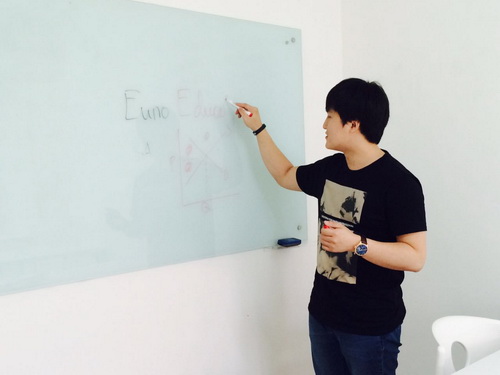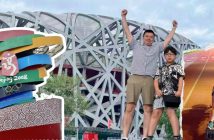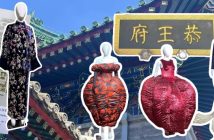
In a city with millions of inhabitants, it’s easy to get lost in the vast numbers and forget that those numbers relate to people. Beijing’s a melting pot of cultures influenced by people from far and near. The Beijing Kaleidoscope series gives you a snippet into the lives of both expats and locals to show their diverse perspective on the city they call home.
Jiyun Hyo is the founder and chief executive officer of Euno Education and happens to be the fourth person we spotlight in this series. The 27-year-old Korean currently lives with his wife and son in Wangjing, and plans to stay in Beijing for as long as possible. Having lived here for four years, his relationship with Beijing is defined by much more than time.
Why did you come to Beijing?
I came here to make a living. At first, I decided to come to Beijing because my wife was attending college here. Then I went to Shanghai to partake in business, which did not go very well. I decided that I wanted to own an education company of my own, so I came back to Beijing and set up Euno Education.
How would you describe life in Beijing?
Honestly, it’s quite low-key and not as dazzling as people might think. Everything’s very chill. But that’s probably because I’ve gotten so used to Beijing; it’s become a home for me. My life in Beijing is very comfortable, and I’m content to be living here.
Do you think you have become part of Beijing, or vice versa?
I don’t feel the necessity of deciding which is part of which, because Beijing is already my home. If I was a foreigner, I would be able to decide whether I was a part of Beijing, or whether Beijing had become a part of me. But I don’t consider myself a foreigner. For me, I’ve almost become one with Beijing. It’s so comfortable to an extent that it feels like I have spent more than just four years living in Beijing. I’ve started and am planning to spend my adult life in Beijing. Even during my high school years spent in Tianjin, I frequently came over to Beijing during school soccer activities, and that’s probably why Beijing feels even more familiar.

What would you say that you have gained or lost from living in Beijing?
I would say I have gained money and opportunity. I don’t think I have lost anything—Beijing didn’t take away anything from me.
If you could paint a picture of Beijing, what would you paint?
I would paint a bright, white sky. I feel that the white sky, instead of the blue sky, is proof that a lot of things are going on in Beijing. If people weren’t working diligently enough, the sky wouldn’t be white; it would be clear blue. A white sky shows that the people in Beijing are very hardworking. Although it signifies pollution, it also shows that Beijing is a very vibrant city. It tells me that something is going on. I also feel that a blue sky would be too common. I wake up every day to see a white sky in Beijing, and it’s something quite uncommon in other places.
If you could take one memory from Beijing, what would it be?
It would be the moment my son was born.
Beijing is the birthplace of two of my babies: My son, and Euno Education.
Beijing has never been foreign for Hyo. It’s the birthplace of not only his son and his business, but also a home where he found comfort. Unlike the gray asphalt it is commonly associated with, Beijing stays a bright, white sky for him.
Judy Jeon, was our July intern, attends the Western Academy of Beijing and decided to brave the murky waters of magazine writing. She is a writer in her school’s Roots & Shoots organization, and also leads an orchestra. With less than a year left to stay in Beijing, Judy is setting out to gather different views about the place. She likes to read, hang out with friends, and can be found exploring Chinese culture around the hutongs.
Photos: Judy Jeon



